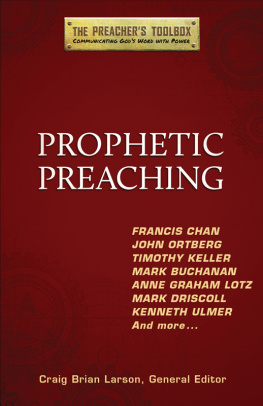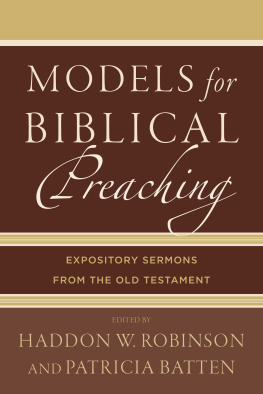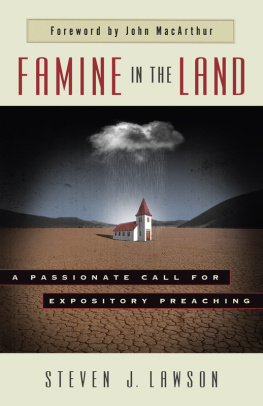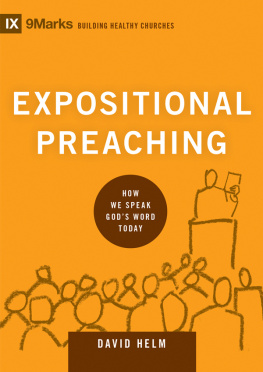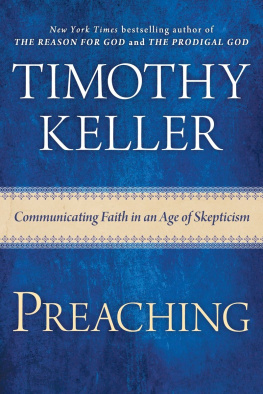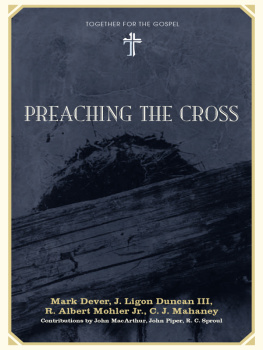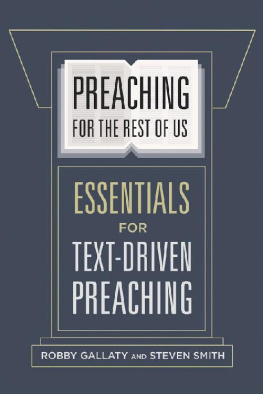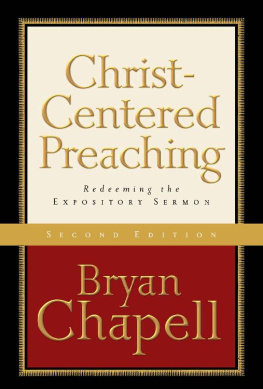Thank you for downloading this Crossway book.
Sign-up for the Crossway Newsletter for updates on special offers, new resources, and exciting global ministry initiatives:
Crossway Newsletter
Or, if you prefer, we would love to connect with you online:
Facebook
Twitter
Google +
Preaching: A Biblical Theology
Copyright 2013 by Jason C. Meyer
Published by Crossway
1300 Crescent Street
Wheaton, Illinois 60187
All rights reserved. No part of this publication may be reproduced, stored in a retrieval system, or transmitted in any form by any means, electronic, mechanical, photocopy, recording, or otherwise, without the prior permission of the publisher, except as provided for by USA copyright law.
Cover design: Dual Identity, inc.
Cover image: Abe Goolsby, officinaabrahae.com
First printing 2013
Printed in the United States of America
Unless otherwise indicated, Scripture quotations are from the ESV Bible ( The Holy Bible, English Standard Version ), copyright 2001 by Crossway. 2011 Text Edition. Used by permission. All rights reserved.
Scripture quotations marked HCSB are from The Holman Christian Standard Bible . Copyright 1999, 2000, 2002, 2003 by Holman Bible Publishers. Used by permission.
Scripture quotations marked NASB are from The New American Standard Bible . Copyright The Lockman Foundation 1960, 1962, 1963, 1968, 1971, 1972, 1973, 1975, 1977, 1995. Used by permission.
Scripture references marked RSV are from The Revised Standard Version . Copyright 1946, 1952, 1971, 1973 by the Division of Christian Education of the National Council of the Churches of Christ in the U.S.A.
Scripture quotations marked AT are the author's translation.
All emphases in Scripture quotations have been added by the author.
Trade paperback ISBN: 978-1-4335-1971-0
Mobipocket ISBN: 978-1-4335-1973-4
PDF ISBN: 978-1-4335-1972-7
ePub ISBN: 978-1-4335-1974-1
Library of Congress Cataloging-in-Publication Data
Meyer, Jason C. (Jason Curtis), 1976.
Preaching : a biblical theology / Jason C. Meyer.
1 online resource
Includes bibliographical references and index.
Description based on print version record and CIP data provided by publisher; resource not viewed.
ISBN 978-1-4335-1972-7 (pdf) ISBN 978-1-4335-1973-4 (mobi) ISBN 978-1-4335-1974-1 (epub) ISBN 978-1-4335-1971-0 (tp)
1. Preaching. 2. BibleHomiletical use. I. Title.
BV4211.3
251dc23
2013018464
CONTENTS
PART ONE
THE BIG PICTURE: BIBLICAL THEOLOGY OF THE MINISTRY OF THE WORD |
| 1 |
| 2 |
| 3 |
| 4 |
| 5 |
PART TWO
A SURVEY OF PARADIGM SHIFTS IN THE MINISTRY OF THE WORD |
| 6 |
| 7 |
| 8 |
| 9 |
| 10 |
| 11 |
| 12 |
| 13 |
| 14 |
| 15 |
| 16 |
PART THREE
EXPOSITORY PREACHING TODAY |
| 17 |
| 18 |
| 19 |
PART FOUR
SOUNDINGS FROM SYSTEMATIC THEOLOGY |
| 20 |
| 21 |
| 22 |
PART FIVE
CONCLUSIONS AND APPLICATIONS |
| 23 |
For if I preach the gospel, that gives me no ground for boasting. For necessity is laid upon me. Woe to me if I do not preach the gospel! For if I do this of my own will, I have a reward, but if not of my own will, I am still entrusted with a stewardship .
1 Corinthians 9:1617
THREE CATEGORIES
The central question of this book is, what is preaching? Answering that question forces us to address a broader question: what is the ministry of the word? The ministry of the word flows from the fact that God entrusts his people with his word. His people take that word and faithfully serve others with it. The ministry of the word includes many ministries within the church, such as counseling and personal evangelism, not just preaching. This book addresses questions common to any word-based ministry, but preaching is the main ministry I have in view. Three big-picture biblical categories best sum up the ministry of the word in Scripture: stewarding, heralding, and encountering. This chapter defines them and sketches a very brief biblical overview.
THESIS
My thesis is that the ministry of the word in Scripture is stewarding and heralding Gods word in such a way that people encounter God through his word. Notice that this thesis highlights three components, which are actually three sequential phases of the ministry of the word.
The first phase is the stewarding phase. It focuses on faithfully receiving Gods word. The steward is entrusted with the word of God. The second phase is the heralding of Gods word. God intends for the stewarded word to be heralded. The preacher gives a human voice to the divine word so that others will hear from God. The third phase is encountering God through his word. In this step, the responsibility to steward the word passes from the preacher to the people. This phase is a time of great gravity because every word from God demands a response. These three elements are three sequential phases in the dynamic process of preaching Gods word: stewarding, heralding, and encountering.
EXPLANATION OF THE THESIS: THREE SUITCASES TO UNPACK
The three parts of the thesis statement are like three suitcases so stuffed with meaning that they are bursting at the seams and demanding to be unpacked one at a time. Lets begin unpacking.
SUITCASE 1: STEWARDING GODS WORD
The first phase focuses on the content of preaching, which is the stewarded word of God . On this score, it is hard to improve upon Pauls pithy summary in 1 Corinthians 4:12. He says that a steward is one who has been entrusted with something (i.e., the what ) and so he must be found faithful (i.e., the how ) with respect to what has been entrusted. This is how one should regard us, as servants of Christ and stewards of the mysteries of God. Moreover, it is required of stewards that they be found faithful (4:12).
Mark Dever offers a succinct definition of a steward: A steward is someone who is not an owner but one who is entrusted with someone elses property. God is the Master, the word is his property, and the preacher is the appointed servant entrusted with it.
This stewardship of the word may take different forms at different times (patriarchs, prophets, scribes, just to name a few), but the same basic calling ties these stewards together throughout the pages of Scripture.
SUITCASE 2: HERALDING GODS WORD
The second phase of preaching is heralding Gods word. The emphasis on heralding is on tone of the delivery. Preaching is not discussing or explaining something with the tone and tenor of a fireside chat. The herald is the town crier that speaks with the forceful tone of hear ye, hear ye. In other words, the herald made his proclamation with a rousing attention-getting noise that could not be ignored.
Gordon Hugenberger reinforces the gravity of the heralds task by stressing the political or military associations of the word. He points to the work of Suidas, the tenth-century AD Greek lexicographer, who said, A herald is in time of war what an ambassador is in peace. The heralds authority is completely derived and is legitimate only to the degree that he faithfully represents the one who sent him.




